Journal of Social Sciences
Üsküdar University Journal of Social Sciences (JOSOC) is a refereed journal published twice a year in May and November in both Turkish and English. The purpose of Üsküdar University Journal of Social Sciences is to provide the readers with the original studies of Turkish and international researchers in the field of social sciences. In the Üskudar University Journal of Social Sciences, articles from the disciplines of Political Science and International Relations, History, Sociology, Cultural Studies, Psychology, Philosophy, and Linguistics are published.
Journal Web Site: https://sosyalbilimlerdergisi.com/
Üsküdar University Journal of Social Sciences (JOSOC) is a refereed journal published twice a year in May and November in both Turkish and English. JOSOC is an open-access journal and article submission/evaluation process is free of charge.
The journal employs double-blind refereeing system.
Objective
The purpose of Üsküdar University Journal of Social Sciences is to provide the readers with the original studies of Turkish and international researchers in the field of social sciences.
Scope
In the Üskudar University Journal of Social Sciences, articles from the disciplines of Political Science and International Relations, History, Sociology, Cultural Studies, Psychology, Philosophy, Communication Sciences and Linguistic are published.
Publication Principles
The opinions in the articles published in Üsküdar University Journal of Social Sciences belong to the author. The articles published in another journal, book, and so on are not accepted. National or international conference presentations, seminar presentations, or panel presentations can be included in the publication process after being specified in the footnote and converted into the article format.
Academic articles published in the journal can only be reproduced for educational purposes. The articles and the graphics and tables in the articles cannot be duplicated or archived in part or as a whole without permission except for educational purposes. Quotations may be made from the articles under the condition that they are indicated in the academic publications.
It is assumed that the authors undertake that they would not claim royalties for the articles they submit to Üsküdar University Journal of Social Sciences.
Referee's Procession
1. The Journal Editorial Board prepares the submitted articles before the referee procession. The articles that receive the “Referee process can begin” signal, approvals are sent to two experts national or international judgments in the field.
2. If both positive and negative response are received from two referees, the article will then be sent to a third referee.
3. If two rejections are given from the referees, the referee reports with the “non-issuable judgment” are delivered to the author.
4. In case “correction decision” is received from the referees, the articles are delivered to the author along with the referee report, and a maximum of 1 (one) month is given to make the necessary corrections.
5. The author must consider the criticism, evaluation, and correction made by the referee and the Editorial Board. In case of a disagreement, the author has the right to state those points on a separate page with her or his justifications.
6. If needed, the revised article might be sent to the same referee, and the article received the “issuable report” from both referees are included in “the list of articles to be published” by the Editorial Board, regarding the content of the journal and based on the date of completion of the referee reports.
7. Publications submitted to the journal cannot be returned whether they are published or not published.
EDITORS
Prof. İbrahim Özdemir, Üsküdar University
Prof. Sevil Atasoy, Üsküdar University
Asst. Prof. Uygar Aydemir, Üsküdar University
VICE EDITOR
Asst. Prof. Elif Kurtuluş, Üsküdar University
In order to contact the Editors, kindly send email to uusbd@uskudar.edu.tr
PSYCHOLOGY FIELD EDITOR
Asst. Prof. Meltem Narter, Üsküdar University
PUBLICATION BOARD
Res. Asst. Cemal Cem Anarat, Ph.D., Üsküdar University
Res. Asst. Deniz Atacan, Üsküdar University
Res. Asst. Salih Bilgin, Üsküdar University
Res. Asst. Bengi Çakmak, Üsküdar University
Res. Asst. Doğan Demirkıran, Üsküdar University
Res. Asst. Beril Sercem Şengül, Üsküdar University
ENGLISH CONTENT EDITOR
Res. Asst. Cansu Civan, Üsküdar University
STATISTICS EDITOR
Asst. Prof. Elif Kurtuluş, Üsküdar University
COPY EDITORS
Res. Asst. Berat Dağ, Ph.D., Üsküdar University
Res. Asst. Merve Arlı Özekes, Üsküdar University
Res. Asst. Buğra Can Bayçifci, Üsküdar University
Res. Asst. Begüm Merve Çabuk, Üsküdar University
Res. Asst. Betül Çelebi Dağ, Üsküdar University
Res. Asst. Ali Ekmekci, Üsküdar University
Res. Asst. Yelda İbadi, Üsküdar University
Res. Asst. Safura Koçoğlu Eyiler, Üsküdar University
Res. Asst. Hasan Özdemir, Üsküdar University
Üsküdar Üniversitesi Adına Sahibi
A. Furkan Tarhan
Üsküdar Üniversitesi Mütevelli Heyeti Başkanı
EDITORIAL BOARD
Prof. Amr Abdalla, University for Peace
Prof. Wolfgang Gieler, Friedrich Schiller Jena University
Prof. Soner Karagül, Çanakkale Onsekiz Mart University
Prof. Hasan Köni, İstanbul Kültür University
Prof. Adnan Ömerustaoğlu, Birûni University
Prof. Cumhur Taş, Üsküdar University
Asst. Prof. Vanessa Tinker, Collegium Civitas
PUBLICATION BOARD
Res. Asst. Cemal Cem Anarat, Ph.D., Üsküdar University
Res. Asst. Deniz Atacan, Üsküdar University
Res. Asst. Salih Bilgin, Üsküdar University
Res. Asst. Bengi Çakmak, Üsküdar University
Res. Asst. Doğan Demirkıran, Üsküdar University
Res. Asst. Beril Sercem Şengül, Üsküdar University
ADVISORY BOARD
Prof. Deniz Ülke Arıboğan, Ph.D., Üsküdar University
Prof. Sevil Atasoy, Ph.D., Üsküdar University
Prof. Sevtap Demirci, Ph.D., Boğaziçi University
Prof. Barış Erdoğan, Ph.D., Üsküdar University
Prof. Mohammad Faghfoory, Ph.D., George Washington University
Prof. Nazife Güngör, Ph.D., Üsküdar University
Prof. Havva Kök Arslan, Ph.D., Üsküdar University
Prof. Ragıp Kutay Karaca, Ph.D., İstanbul Aydın University
Prof. İsmail Arda Odabaşı, Ph.D., İbn Haldun University
Prof. İbrahim Özdemir, Ph.D., Üsküdar University
Prof. Selahattin Sarı, Ph.D., Doğuş University
Prof. Nevzat Tarhan, MD, Üsküdar University
Prof. Mehmet Bülent Uludağ, Ph.D., Ondokuz Mayıs University
Prof. Ateş Uslu, Ph.D., İstanbul University
Assoc. Prof. Selçuk Akşin Somel, Ph.D., Sabancı University
We invite you to send us articles to be published in Üsküdar University Journal of Social Sciences (ISSN (Print) 2459-0223, ISSN (Online) 2717-7769). Üsküdar University Journal of Social Sciences as a refereed journal that is published twice a year, in May and November, both in Turkish and English. You may access all of our issues via http://dergipark.gov.tr/uskudarsbd link or the Periodicals tab on Üsküdar University’s website https://uskudar.edu.tr/en/periodicals/12/journal-of-social-sciences.
Please submit your article using the “Start a New Submission” button on the DergiPark page (http://dergipark.gov.tr/uskudarsbd). You may need to create an account to be able to submit if you do not have an account on DergiPark.
Publication Guidelines
Download PDF version: Uskudar University Journal of Social Sciences Publication Guidelines (TR/ENG)
Download Copyright Transfer and Author Agreement: Copyright Transfer and Author Agreement
GENERAL PRINCIPLES
Papers submitted to Üsküdar University Journal of Social Sciences must not be published before or sent for publication elsewhere.
The copyright of the papers published in the journal belongs to the journal. The author agrees to transfer all copyrights of the paper that is approved to be published in the journal. Following the submission of the article to the journal, the author accepts to abide by the ethical principles and publication guidelines. The Editorial Board sends two copies of the journals to the author in exchange for the copyright. Any re-publication of the published work is subjected to the approval of the journal. The articles must be prepared on the basis of The Chicago Manual of Style (17th Edition, Notes and Bibliography) citation rules.
Regarding translations submitted to the journal, publication permission of the author and the original text are required.
The opinions, thoughts, and proposals within the articles are but reflections of the authors and do not, in any way, represent those of Üsküdar University.
Publication guidelines and ethical principles can be accessed via the sosyalbilimlerdergisi.com/en hyperlink. In case of differences between published and digital versions, the digital version is considered valid.
A. PRINCIPLES AS TO PAGE LAYOUT
- Page layout must be normal, page set up must be 2.5 cm from the top, 2.5 cm from the bottom, 2.5 cm from left, 2.5 cm from right, gutter 0, header 2.5 cm, footer 1.5 cm.
- Line spacing must be 1.5 and 0 pt. except for the references. In references, it must be 0 pt.
- Page numbers must be placed at the bottom on the right.
B. PRINCIPLES AS TO WRITING RULES
- Languages of publication are Turkish and English. Corrections regarding the principles are made by editors/co-editors. The most recent edition of the spelling guide of the Turkish Language Institution is taken into account for language use, punctuation, and abbreviations. The submitted texts must be clear, understandable, and in line with the scientific criteria in terms of language and expression.
- In texts that are written in English, there must be a Turkish ‘Öz’ following the English ‘Abstract’. In texts that are written in Turkish, there must be an English ‘Abstract’ following the Turkish ‘Öz’
- The submitted texts must be no less than 5,000 words (4,000 words for papers that extensively rely on quantitative analyses) and no more than 30 pages or 10,000 words including the Öz/Abstract and references.
- Book reviews must be no more than 2000 words.
- Abstract and Öz, both in Turkish and English, must be no longer than 400 words including the main title in English and Turkish and five keywords for both languages in total. A short version of the title of the text must be indicated after the headline of the article in brackets and in the email that is sent to the editor with the article.
- The main title must be 14pt., bold and all in upper-case. The subtitles must be 12pt., bold and with only initials in upper-case.
- The name of the author must be written in Times New Roman with a font size of 12 in bold, after a 1-line space under the main title and be centered. The initial of the given name and all letters of the surname must be in upper-case. After surname, a superscripted asterisk(*) must be added and the information regarding the author must be given only in the first page’s footer, written in Times New Roman 10pt. with 1-line spacing, and justified.
- Öz/Abstract and Anahtar kelimeler/Keywords must be in italic.
- The text must be justified, in Times New Roman with a font size of 12. The line spacing must be 1.5 and the paragraphs must start with a 1.25 left indent.
- Footnotes must be justified, in Times New Roman with a font size of 10. The line spacing must be 1 and the text must start with a space after the footnote.
C. PRINCIPLES AS TO REFERENCES AND CITATIONS WITHIN THE TEXT
- The articles must be prepared based on The Chicago Manual of Style (17th Edition, Notes and Bibliography) citation rules.
- The number of footnotes must be given after the punctuation marks within the text.
- Footnotes must be given enumerated below the page, and the citations should not be given within the text.
- There must be a space after the footnote number before the text starts. There is no need for additional space before the upcoming lines.
- The full identity of the cited resources must be given; any uncited resource should not be presented in the references.
- In English articles, footnotes from non-Latin alphabet sources must be Latinized with respect to English spelling. In Turkish articles, footnotes from Turkish sources must be given with respect to Turkish spelling rules. It is recommended to include footnotes in the original language transcription as well.
E.g.
“Фёдор Достое́вский,…” The original reference.
“[Fyodor Dostoevsky,…]” The transcribed version following the original one.
- Some wordings and punctuations in citations may differ in accordance with the language used in the article. For instance, both “sayı:” and “no.” stands for “number” in Turkish and English respectively. Therefore, it may require nuanced usage of citation styles for different languages. If the article is written in Turkish, citations should be given in accordance with the Turkish version of the Publication Guidelines. If the article is written in English, then citations should be given in accordance with the English version of the Publication Guidelines. For example, English wordings such as “et al.,” “Translated by,” will be used for the articles written in English, while Turkish statements such as “vd.,” “Çeviren:,” will be used for the articles written in Turkish.
- Direct quoting: Direct quotations used within the text must be given by quotation marks (“ ”) and must be cited as suited to the footnote system. Quotations less than five lines must not be separate from the ongoing text, whereas quotations with five or more lines must be 1 cm. from the right, and from the left 1.25 cm. (from the point where the paragraph starts) indent. As for quotations more than four lines, line spacing must be 1.15, and the font must be 11pt.
- For further information, please see the Chicago Manual of Style (17th Edition, Notes and Bibliography) https://www.chicagomanualofstyle.org/home.html
- Sample citations according to The Chicago Manual of Style (17th Edition, Notes and Bibliography) are given below.
Books
- Works with a single author:
Notes:
Agah Sırrı Levend, Türk Edebiyatı Tarihi (Ankara: AKDTYK TTK Yayınları, 1988), 23.
Charles Dickens, Hard Times: For These Times (New York: Signet Classic, 1997), 35.
Shortened Notes:
Levend, Türk Edebiyatı Tarihi, 37.
Dickens, Hard Times, 67.
Bibliography entries (in alphabetical order):
Levend, Agah Sırrı. Türk Edebiyatı Tarihi. Ankara: AKDTYK TTK Yayınları, 1988.
Dickens, Charles. Hard Times: For These Times. New York: Signet Classic, 1997.
- Works with two authors:
Notes:
Nusret Özcan and Kemal Aykut, Mustafa Kutlu Kitabı (İstanbul: Nehir Yayınları, 2001), 8.
Shortened Notes:
Özcan and Aykut, Mustafa Kutlu Kitabı, 34.
Bibliography entries (in alphabetical order):
Özcan, Nusret and Kemal Aykut. Mustafa Kutlu Kitabı. İstanbul: Nehir Yayınları, 2001.
- Works with three authors:
Notes:
İrfan Dağdelen, Hüseyin Türkmen, and Nergis Ulu, Türk Kütüphaneciliğinden İzdüşümler: Nail Bayraktara Armağan (İstanbul: Büyükşehir Belediye Başkanlığı - Kültürel ve Sosyal İşler Daire Başkanlığı - Kütüphane ve Müzeler Müdürlüğü, 2005), 55.
Shortened Notes:
Dağdelen, Türkmen and Ulu, Türk Kütüphaneciliğinden İzdüşümler, 87.
Bibliography entries (in alphabetical order):
Dağdelen, İrfan, Hüseyin Türkmen, and Nergis Ulu. Türk Kütüphaneciliğinden İzdüşümler: Nail Bayraktara Armağan. İstanbul: Büyükşehir Belediye Başkanlığı - Kültürel ve Sosyal İşler Daire Başkanlığı - Kütüphane ve Müzeler Müdürlüğü, 2005.
- Works with four or more authors:
Notes:
Neclâ Pekolcay et al., İslâmi Türk Edebiyatına Giriş (İstanbul: Dergâh Yayınları, 1981), 7.
Shortened Notes:
Pekolcay et al., İslâmi Türk Edebiyatına Giriş, 18.
Bibliography entries (in alphabetical order):
Pekolcay, Neclâ et al.. İslâmi Türk Edebiyatına Giriş. İstanbul: Dergâh Yayınları, 1981.
- Works with a non-specified author or editor:
Notes:
“Türkiye ve Dünyada Yükseköğretim,” Bilim ve Teknoloji (İstanbul: TÜSİAD Yayınları, 1994), 81.
Shortened Notes:
“Türkiye ve Dünyada Yükseköğretim,” 81.
Bibliography entries (in alphabetical order):
“Türkiye ve Dünyada Yükseköğretim.” Bilim ve Teknoloji. İstanbul: TÜSİAD Yayınları, 1994.
- Book Chapters:
Notes:
M. Efe Çaman, Kenan Dağcı and M. Ali Akyurt, “Yemen: "Yeni Afganistan mı?” in Dünya Çatışmaları Çatışma Bölgeleri ve Konuları 2, eds. Kemal İnat, Burhanettin Duran ve Muhittin Ataman, (Ankara: Nobel, 2010), 340.
Shortened Notes:
Çaman et al, “Yemen: "Yeni Afganistan mı?,” 347.
Bibliography entries (in alphabetical order):
M. Efe Çaman, Kenan Dağcı and M. Ali Akyurt. “Yemen: "Yeni Afganistan mı?” in Dünya Çatışmaları Çatışma Bölgeleri ve Konuları 2, edited by Kemal İnat, Burhanettin Duran ve Muhittin Ataman, 337-354. Ankara: Nobel, 2010.
- Author plus editor or translator
Notes:
M. Efe Çaman, Kenan Dağcı and M. Ali Akyurt, “Yemen: "Yeni Afganistan mı?” in Dünya Çatışmaları Çatışma Bölgeleri ve Konuları 2, eds. Kemal İnat, Burhanettin Duran ve Muhittin Ataman (Ankara: Nobel, 2010), 340.
Suraiya Faroqhi, Osmanlı Tarihi Nasıl İncelenir: Kaynaklara Giriş, trans. Zeynep Altok. (İstanbul: Tarih Vakfı Yurt Yayınları, 2003), 57.
Shortened Notes:
Çaman et al, “Yemen: "Yeni Afganistan mı?,” 347.
Faroqhi, Osmanlı Tarihi Nasıl İncelenir, 58.
Bibliography entries (in alphabetical order):
M. Efe Çaman, Kenan Dağcı and M. Ali Akyurt. “Yemen: "Yeni Afganistan mı?” in Dünya Çatışmaları Çatışma Bölgeleri ve Konuları 2, edited by Kemal İnat, Burhanettin Duran ve Muhittin Ataman, 337-354. Ankara: Nobel, 2010.
Faroqhi, Suraiya. Osmanlı Tarihi Nasıl İncelenir: Kaynaklara Giriş, Translated by Zeynep Altok, İstanbul: Tarih Vakfı Yurt Yayınları, 2003.
Journal Articles
In a note, cite specific page numbers. In the bibliography, include the page range for the whole article.
For articles consulted online, include a URL or the name of the database. Many journal articles list a DOI (Digital Object Identifier). A DOI forms a permanent URL that begins https://doi.org/. This URL is preferable to the URL in your browser’s address bar.
- Articles with one author:
Notes:
Niu Song, “The Strategic Partnership between South Korea and the United Arab Emirates,” Güvenlik Stratejileri Dergisi 17, (April 2013): 132-136.
Shortened Notes:
Niu Song, “The Strategic Partnership,” 132-136.
Bibliography entries (in alphabetical order):
Niu Song, “The Strategic Partnership between South Korea and the United Arab Emirates,” Güvenlik Stratejileri Dergisi 17, (April 2013): 122-146.
- Papers with two authors:
Notes:
Tom D. Lewisand and Gerald Graham, “Seven Tips for Effective Listening,” British Journal of Social Work 30, (2003): 13-35.
Shortened Notes:
Lewisand and Graham, “Seven Tips for Effective Listening,” 15-23.
Bibliography entries (in alphabetical order):
Lewisand, Tom D. and Gerald Graham, “Seven Tips for Effective Listening,” British Journal of Social Work 30, (2003): 1-43.
- Papers with three authors:
Notes:
Shao-Hsun Keng, Chun-Hung Lin, and Peter F. Orazem, “Expanding College Access in Taiwan, 1978–2014: Effects on Graduate Quality and Income Inequality,” Journal of Human Capital 11, (Spring 2017): 9–10, https://doi.org/10.1086/690235
Shortened Notes:
Keng, Lin, and Orazem, “Expanding College Access,” 23.
Bibliography entries (in alphabetical order):
Keng, Shao-Hsun, Chun-Hung Lin, and Peter F. Orazem. “Expanding College Access in Taiwan, 1978–2014: Effects on Graduate Quality and Income Inequality.” Journal of Human Capital 11, (Spring 2017): 1–34, https://doi.org/10.1086/690235
- Papers with four or more authors:
Notes:
Rachel A. Bay et al., “Predicting Responses to Contemporary Environmental Change Using Evolutionary Response Architectures.” American Naturalist 189, no.5, (May 2017): 465, https://doi.org/10.1086/691233
Shortened Notes:
Bay et al., “Predicting Responses,” 465.
Bibliography entries (in alphabetical order):
Bay, Rachael A., Noah Rose, Rowan Barrett, Louis Bernatchez, Cameron K. Ghalambor, Jesse R. Lasky, Rachel B. Brem, Stephen R. Palumbi, and Peter Ralph. “Predicting Responses to Contemporary Environmental Change Using Evolutionary Response Architectures,” American Naturalist 189, no.5, (May 2017): 463–73, https://doi.org/10.1086/691233
- Works with a non-specified author:
Notes:
Balkanlarda Türk Varlığı,” Toplumsal Tarih 7 (Mayıs 1990): 8.
Shortened Notes:
Balkanlarda Türk Varlığı,” 8.
Bibliography entries (in alphabetical order):
Balkanlarda Türk Varlığı,” Toplumsal Tarih 7 (Mayıs 1990): 1-17.
- Papers from an Online Journal:
Add DOI (Digital Object Identifier) number if applicable. DOI number, when added to http://dx.doi. org/ address on a browser, it directs the user to the source. If there is no DOI, add URL.
Notes:
Dinçer Eşitgin, “Büyüme Romanı (Bildungsroman) Kavramı Etrafında Aşk-ı Memnu ve Roman Kişisi Nihal,” Milli Eğitim Dergisi 162, (2004): 153-168, accessed 5 April 2005, http://yayim.meb.gov.tr/yayimlar/162/esitgin.htm
Gueorgi Kossinets and Duncan J. Watts, “Origins of Homophily in an Evolving Social Network,” American Journal of Sociology 115, (2009): 411, accessed 28 February 2010, https://doi.org/10.1086/599247
Shortened Notes:
Eşitgin, “Büyüme Romanı,” Milli Eğitim Dergisi.
Bibliography entries (in alphabetical order):
Eşitgin Dinçer, “Büyüme Romanı (Bildungsroman) Kavramı Etrafında Aşk-ı Memnu ve Roman Kişisi Nihal,” Milli Eğitim Dergisi 162, (2004):149-172, Accessed 5 April 2005, http:/ /yayim.meb.gov.tr/yayimlar/ 162 /esitgin.htm
Gueorgi Kossinets and Duncan J. Watts. “Origins of Homophily in an Evolving Social Network,” American Journal of Sociology 115, (2009): 411, Accessed 28 February 2010, doi.org/10.1086/599247
- Papers from Daily Newspapers or Journals:
Notes:
Taha Akyol, “Sosyal Bilim Ödülleri,” Milliyet, 28 February 2005,
Sheryl Gay Stolberg and Robert Pear, “Wary Centrists Posing Challenge in Health Care Vote', New York Times, 27 February 2010, accessed 28 February 2010, http://www.nytimes.com/2010/02/28/us/politics/28health.html
Daniel Mendelsohn, “But Enough about Me,” New Yorker, 25 January 2010, 68.
Shortened Notes:
Akyol, “Sosyal Bilim Ödülleri.”
Bibliography entries (in alphabetical order):
Akyol, Taha, “Sosyal Bilim Ödülleri,” Milliyet, 28 February 2005,
Thesis or Dissertation
Notes:
Avni Erdemir, “Muslihu'd-din Mustafa İbn Vefâ Hayatı Eserleri Tesirleri ve Manzum Eserlerinin Tenkidli Metni” (Unpublished PhD. diss., Gazi Üniversitesi, 1999), 6-10.
Azize Şahin, “Üniversite Öğrencilerinde Bilinçli Farkındalık ile Yaşam Doyumu ve İyi Oluş Arasındaki İlişkiler” (Master Thesis, Üsküdar Üniversitesi, 2018), 8.
Shortened Notes:
Erdemir, “Muslihu'd-din Mustafa,” 6-10.
Şahin, “Üniversite Öğrencilerinde Bilinçli Farkındalık,” 8.
Bibliography entries (in alphabetical order):
Erdemir, Avni. “Muslihu'd-din Mustafa İbn Vefâ Hayatı Eserleri Tesirleri ve Manzum Eserlerinin Tenkidli Metni.” Unpublished PhD. diss., Gazi Üniversitesi, 1999.
Şahin, Azize. “Üniversite Öğrencilerinde Bilinçli Farkındalık ile Yaşam Doyumu ve İyi Oluş Arasındaki İlişkiler.” Master Thesis, Üsküdar Üniversitesi, İstanbul, 2018.
Archival Materials
Notes:
BOA, İ. Mes. Müh., 2079.
Bibliography entries (in alphabetical order):
Başbakanlık Osmanlı Arşivi (BOA), İrade Mesâil-i Mühimme (İ. Mes. Müh), 2079.
Reports
- Reports with an author specified
Notes:
Fatma Gök, Öğretmen Profili Araştırma Raporu (Ankara: Eğitim Bilim ve Kültür Emekçileri Sendikası Yayınları 1999), 6-25
Shortened Notes:
Gök, Öğretmen Profili Araştırma Raporu, 6-25
Bibliography entries (in alphabetical order):
Gök, Fatma. Öğretmen Profili Araştırma Raporu. (Ankara: Eğitim Bilim ve Kültür Emekçileri Sendikası Yayınları, 1999).
- Reports with a non-specified author
Notes:
Arnavutluk Ülke Raporu (Ankara: TİKA Yayını 1995), 7.
Shortened Notes:
Arnavutluk Ülke Raporu, 7.
Bibliography entries (in alphabetical order):
Arnavutluk Ülke Raporu. Ankara: TİKA Yayını 1995.
- Reports of institutions, companies or institutes with a non-specified author
Notes:
Dış Politika Enstitüsü, Uluslararası İlişkilerle İlgili Anayasaya Konabilecek Hükümler, (Ankara: Siyasal Bilgiler Fakültesi Yayınları, 1990), 33.
Shortened Notes:
Dış Politika Enstitüsü, Uluslararası İlişkilerle İlgili Anayasaya Konabilecek Hükümler, 33.
Bibliography entries (in alphabetical order):
Dış Politika Enstitüsü, Uluslararası İlişkilerle İlgili Anayasaya Konabilecek Hükümler. Ankara: Siyasal Bilgiler Fakültesi Yayınları, 1990.
Encyclopedias
Notes:
Ömer C. Saraç, “Kağıt, Milli Gelir,” in Ak İktisat Ansiklopedisi 1, (İstanbul: Ak Yayınları, 1973), 20-30.
Shortened Notes:
Saraç, “Kağıt, Milli Gelir,” 20-30.
Bibliography entries (in alphabetical order):
Saraç, Ömer C., “Kağıt, Milli Gelir” In Ak İktisat Ansiklopedisi 1, (İstanbul: Ak Yayınları, 1973), 17-36.
Interviews
Notes:
Edward Snowden. ‘‘Edward Snowden Explains How to Reclaim Your Privacy.’’ Interview by Micah Lee. The Intercept, November 12, 2015, accessed Jan 1, 2017, https://theintercept.com/2015/11/12/edward-snowden-explains-how-to-reclaim-your-privacy/.
Shortened Notes:
Snowden, interview.
Bibliography entries (in alphabetical order):
Snowden, Edward. ‘‘Edward Snowden Explains How to Reclaim Your Privacy.’’ Interview by Micah Lee. The Intercept, November 12, 2015. Accessed Jan 1, 2017, https://theintercept.com/2015/11/12/edward-snowden-explains-how-to-reclaim-your-privacy/.
E-Books
Notes:
Fyodor Dostoevsky, Crime and Punishment, trans. Constance Garnett. ed. William Allan Nelson. (New York: P.F. Collier & Son, 1917), 413 http://archive.org/details/crimepunishmentoodostuoft.
Jane Austen, Pride and Prejudice (New York: Penguin Classics, 2007), chap. 3, Kindle.
Shortened Notes:
Dostoevsky, Crime and Punishment, 413
Austen, Pride and Prejudice, chap.14
Bibliography entries (in alphabetical order):
Dostoevsky, Fyodor, Crime and Punishment, Translated by Constance Garnett. Edited by William Allan Nelson. New York: P.F. Collier & Son, 1917. http://archive.org/details/crimepunishmentoodostuoft.
Austen, Jane. Pride and Prejudice. (New York: Penguin Classics, 2007), Kindle.
Social Media
Notes:
Chicago Manual of Style. “Is the world ready for singular they? We thought so back in 1993.” Facebook, April 2015. https://www.facebook.com/ChicagoManual/posts/is-the-world-ready-for-singular-they-we-thought-so-back-in-1993-when-the-14th-ed/10152906193679151/
Shortened Notes:
Chicago Manual of Style. “Is the world ready”
Bibliography entries (in alphabetical order):
Chicago Manual of Style. Is the world ready for singular they? We thought so back in 1993. Facebook, April 2015. https://www.facebook.com/ChicagoManual/posts/is-the-world-ready-for-singular-they-we-thought-so-back-in-1993-when-the-14th-ed/10152906193679151/
Website Contents
Notes
“Privacy Policy,” Privacy & Terms, Google, last modified April 17, 2017, https://www.google.com/policies/privacy/.
“About Yale: Yale Facts,” Yale University, accessed May 1, 2017, https://www.yale.edu/about-yale/yale-facts.
Katie Bouman, “How to Take a Picture of a Black Hole,” filmed November 2016 at TEDxBeaconStreet, Brookline, MA, video, 12:51, https://www.ted.com/talks/katie_bouman_what_does_a_black_hole_look_like.
Shortened notes
Google, “Privacy Policy.”
“Yale Facts.”
Bouman, “Black Hole.”
Bibliography entries (in alphabetical order)
Bouman, Katie. “How to Take a Picture of a Black Hole.” Filmed November 2016 at TEDxBeaconStreet, Brookline, MA. Video, 12:51. https://www.ted.com/talks/katie_bouman_what_does_a_black_hole_look_like.
Google. “Privacy Policy.” Privacy & Terms. Last modified April 17, 2017. https://www.google.com/policies/privacy/.
Yale University. “About Yale: Yale Facts.” Accessed May 1, 2017. https://www.yale.edu/about-yale/yale-facts.
Subsequent Footnotes to the Same Source
- For the subsequent footnotes to the same source, authors may use “Ibid” abbreviation instead of shortened notes. If a page number is also the same as previous footnotes, only Ibid. must be used; if a page number is different, then, the page number must be written after “Ibid” abbreviation.
E.g.
Agah Sırrı Levend, Türk Edebiyatı Tarihi (Ankara: AKDTYK TTK Yayınları, 1988), 23.
Ibid., 26.
- If certain author has citations for more than one of his/her pieces in the same article, then in the footnotes it must be author's name surname, year of publication and page number; if the author has more than one piece in same year, then, the letters of A, B, C must be added to the publication year of the piece. This also must be written as it is, in the bibliography.
D. PRINCIPLES TO ABIDE BY THE RULES OF USING DOCUMENTS, TABLES, FIGURES AND GRAPHS
1. Attachments (documents) must be presented at the end of the text and there must be brief information below, as to the content of the document and proper citation in line with the relevant criteria.
- Other attachments (Tables, Figures, Graphs) must be presented as “Additional Table: 1, Additional Graph: 3, and Additional Figure: 7”; if indicators other than the text are too many in number, attachments must be presented after the References. References to these attachments in the text must be shown as “Additional Table: 1, Additional Graph: 3 or Additional Figure: 7.” If the citation is made for a table, figure, graph or picture, the resource must be indicated.
- Tables within the text must be titled in bold on the table, and the cited source must be given according to the footnote rules.
- Figures, graphs, and maps within the text must be titled below, and the cited source must be given according to the footnote rules.
E. PRINCIPLES AS TO WRITING BIBLIOGRAPHY
- The headline of the bibliography must be written in upper-case and bold, right after the text with two spaces, left-aligned, and without indents.
- References must be alphabetically ordered according to the surnames of the authors.
- Line spacing must be 1 and there must be a given space after each reference.
- Initials of the names and the surnames of the authors must be in upper-case with other letters in lower-case.
- The page range of the paper that is published in a book or a journal must be given at the end of the reference.
- Two or more works from the same author must be referenced as follows:
- The recent work must be written first with other works following the same order.
- The name of the author must not be specified for the second and the following works. There must be — — — mark instead of the name.
F. ASSESSMENT
- The papers that pass the initial editorial evaluation will be sent to two referees of expertise for academic assessment by the Publication Board of the Journal. The paper is accepted for publication if both referees are positive. If one referee report is positive while the other one is negative, the paper is sent to a third referee. The papers that are decided to be reviewed must be submitted by the author(s) within stated days (including the duration of the postal service). The revised text might be re-examined by the demanding referees in case the Publication Board finds it necessary.
- The papers submitted are published upon the final decision of the Publication Board following the “can be submitted” approval of the two experts in the field. Authors should take the criticisms, assessments and revisions of the referees and the Publication Board into account. If the author has any points he/she does not agree with, he/she has the right to specify these issues in a separate page within the justification thereof.
- The papers, following the approval by the referees, may be put in order by the Publication Board, based on principles followed by the editors and also based on the scope of the journal.
Before starting the process of submitting your work to the journal, it is recommended that you consult with editors about when your article will be published if accepted.
Publication, Ethics and Malpractice Policy
Download PDF version: Uskudar University Journal of Social Sciences Publication and Ethical Principles (TR/ENG)
Download Copyright Transfer and Author Agreement: Copyright Transfer and Author Agreement
GENERAL PRINCIPLES
The publication process of Üsküdar University Journal of Social Sciences (henceforth, “The Journal”) is predicated on the objective production, development and sharing of knowledge through scientific methods. The Journal promises to adhere to academic principles and prevent false practices in conformity with academic and ethical standards. In order to maintain the ethical standards for submitted articles, the international standards of the COPE (Committee on Publication Ethics) are taken into account. The journal employs a double-blind refereeing system.
Üsküdar University Journal of Social Sciences is an open-access journal and the article submission/evaluation process is free of charge.
Submitting an article through the DergiPark website starts the submission/evaluation process for publication.
The Journal has the right to edit, publish or not publish the submitted articles.
The author(s) has/have to sign the Copyright Transfer and Author Agreement and has/have to upload the form on the DergiPark page of the Journal along with the manuscript.
A. PEER-REVIEW PROCESS
Articles sent through DergiPark site are initially evaluated for format, scope, and plagiarism at the Secretariat stage. At this stage, edits may be requested from the author within the suggestions of the Secretary, Copyeditors and Language Editors. Articles that are found appropriate in terms of format, scope and originality are transferred to the Editorial stage. In the editorial stage, the article is sent to the expert referees (two referees) after the editorial board evaluation. The referee evaluation process is carried out in accordance with the "Double-Blind Peer-review" rule over the DergiPark system.
The referees may decide on "Accept", "Minor Revision", "Major Revision" and "Reject" for the article. Referee evaluation forms are sent to the author via DergiPark. The author(s) must take into account the criticism, evaluation and corrections of the referees and editors. In case of disagreements regarding the corrections, the author(s) has the right to report them on a separate page with their justifications.
The submitted manuscripts are published with the final decision of the Editors/Vice-Editors, after the approval of the two referees.
Based on the evaluations of the referee and editorial board, the article may be rejected at any stage of the process.
B. ARTICLE REVIEW PROCESS
Regarding the articles submitted to Üsküdar University Journal of Social Sciences for publishing, the initial editorial evaluation is made within the first 30 days. Following the editorial review, if necessary, the author is given 15 days to make the required corrections. The referee review process starts for the articles that successfully passed the initial editorial review. In the referee review process, each referee is given 7 days for accepting the invitation online, and 30 days for the review. Any of the referee’s request to have extra time based on an excuse is taken into consideration. Concerning the articles that successfully went through the referee review process, the author is given 30 days at most to complete the improvement requested by the referees. The article is sent to the referee who wishes to review it, and the referee is given 30 days for this purpose. After the last review is made by the referees, the final form of the article is put into editorial reading to be completed in 15 days. Possible requests for extra time coming from the author or the referees are taken into consideration.
C. RESPONSIBILITIES OF THE EDITORIAL BOARD
Üsküdar University Journal of Social Sciences Editorial Board (henceforth, “The Editorial Board”) and Editors/Vice Editors are responsible for all the processes before, during and after the publication of each and every article submitted to the Journal.
The Editorial Board determines and implements the entire policies of The Journal, including but not limited to publication, blind review, assessment process, and ethical principles.
The initiation of the blind review process for an article does not indicate a publication promise on behalf of The Journal. Likewise, the positive outcome of the review process still necessitates the affirmative decision of The Editorial Board and Editors/Vice Editors for the publication of the article.
The Editorial Board encourages academic honesty. The Editorial Board ensures the originality of the articles by uploading them on iThenticate plagiarism detection software and evaluating their originality report.
The Editorial Board always examines the claims of plagiarism and abuse in regard to published articles. In case it is established that an author committed plagiarism, or used copyrighted material that belongs to third parties without proper and full reference and permission, The Editorial Board reserves the rights, including but not limited, to retract the article, inform the author’s head of department, dean of faculty and/or other academic institutions.
D. RESPONSIBILITIES OF EDITORS/VICE-EDITORS
Üsküdar University Journal of Social Sciences Editors/Vice-Editors are responsible for taking measures related to intellectual property rights, unethical and non-academic behaviours and plagiarism during the publication of articles and journals.
Editors/Vice-Editors, when making positive or negative decisions about the articles, take into consideration the originality of the articles, their contribution to the field, the validity and reliability of the research method, the clarity of the narration, and the purpose and scope of the journal.
Editors/Vice-Editors implement the blind peer review and evaluation processes that are among the publication policies of the journal, keep the identities of the referees and authors confidential, and ensure that each article is evaluated objectively and in due time. Editors may correct errors, inconsistencies, or misleading in the articles. They also evaluate any corrections or discussions about published articles.
Editors/Vice-Editors ensure the protection of personal data within the journal's publication and ethical principles.
Editors/Vice-Editors pay attention to the protection of human and animal rights in articles, attach importance to documenting the explicit consent of the participants of the research used in the article. Editors/Vice-Editors rejects experimental research articles and articles that contain surveys without proper ethics committee approval.
E. RESPONSIBILITIES OF REFEREES
The opinion of the referees shall be given priority in the decision of the JOSOC Editorial Board concerning whether the submitted article will be published or not.
The referees should evaluate the work fairly and objectively following the double-blind peer-review procedure.
Referees must respect the principle of confidentiality. They are obliged not to use the information obtained from the peer review process for their personal benefit. They should not share their reports or any information in relation to the article.
Referee assessments should be objective and constructive. The academic competence of the article should be taken as a fundamental criterion of assessment. Criticisms on the personalities of the authors are not considered appropriate. Referees should provide explanations and arguments via reports that are provided by the Editors/Vice-Editors. Editors/Vice-Editors do not take into account biased and personalized evaluations or unjustified approvals and refusals and appoint a new referee for such articles.
The referees should not accept articles that may result in personal or institutional conflicts of interest.
Referees, in case of detection, should notify the journal editorship of any actual or possible plagiarism, multicasting or simultaneous application.
The referees should conduct the evaluation with neutrality and confidentiality. Due to this principle, they should destroy the articles they have reviewed after the evaluation process. Nationality, gender, religious belief, political view and commercial concerns should not disrupt the academic neutrality of the assessment.
Referees should complete evaluations of the articles within due course. In order to improve the academic quality of the article, the referees' suggestions for revisions are delivered to the authors and, if requested by the referees, the corrections made by the authors are sent to the referees.
F. RESPONSIBILITIES OF AUTHORS
The studies submitted to JOSOC should not contain plagiarism and should be original. The responsibility lies within the authors in regard to this matter.
Any form of plagiarism is a very serious ethical problem, including self-plagiarisms. The evaluation process will be stopped for the articles that contain plagiarism. If any plagiarism is detected after the publication, Editors/Vice-Editors will take necessary measures.
All authors of the articles must have a DergiPark account and when submitting an article via DergiPark all authors must be included. Applications that do not comply with this rule will not be considered.
Due to the publication policy and rules of our journal, different articles by the same author(s) cannot be published in the same issue or in two consecutive issues.
The author reserves the right to withdraw his/her article provided that the author notifies the withdrawal to the editorial board until the publication decision is taken.
Authors should not use discriminatory language based on gender, race, language, belief, culture, class, age, opinion, rank and sexual orientation.
The works/articles should not violate the privacy and intellectual property rights of a third party.
Authors, while submitting their articles, are obliged to fill Copyright Transfer and Author Agreement form which can be accessed via DergiPark and sosyalbilimlerdergisi.com.
Authors are obliged to specify all individuals who have a share in their article. Individuals with significant contributions to their article should be cited as co-authors. An article cannot be published without the consent of all authors.
The name of the persons who do not contribute to the article should not be written as an author. Changing the order of authors’ names, removing and adding authors’ names should not be proposed for an article submitted for publication.
Authors should state if an old version of the article is published in another medium. If the study is compiled from a dissertation/thesis (even if it is unpublished) or an unpublished scientific meeting presentation, this should be indicated on the first page as a footnote.
Authors are responsible for acting in accordance with the existing copyright laws.
If any information or data is requested from the authors during the evaluation process, they should submit the expected information to the editorship.
Authors are responsible for fulfilling the revision suggestions of the Editors/Vice-Editors and the referees. The author has the right to inform the editorship with justification, he/she does not agree with the suggestions of the Editors/Vice-Editors and referees.
All authors shall state any financial and other conflicts of interest in their research papers that may be thought to affect the results or interpretation of that paper. All sources of financial support for the study should be clearly stated.
When an author discovers a serious error or inaccuracy in a published article, it is the responsibility of the author to immediately notify the editorship. In this case, the author is responsible for cooperating with the journal editorship in either withdrawing the article or publishing a revision of the article.
For all researches conducted and for clinical and experimental studies involving humans and animals, which require ethics committee approval, an ethics committee approval must be obtained and should be specified and documented.
G. RETRACTION POLICY
Retraction is a mechanism for correcting the literature and alerting readers to articles that contain such seriously flawed or erroneous content or data that their findings and conclusions cannot be relied upon.
Unreliable content or data may result from honest errors, naïve mistakes, or research misconduct.
“The main purpose of retraction is to correct the literature and ensure its integrity rather than to punish the authors.” (COPE, 2019)
Üsküdar University Journal of Social Sciences attaches importance to contributing to the integrity of the literature and providing original studies to its readers.
Editors will consider retraction of a publication in case(s) of:
- Plagiarism
- Copyright infringements and serious legal issues (eg. privacy)
- Reporting unethical research
- Containing a data without proper permission for use
- Clear evidence regarding unreliable findings as a result of data manipulation, major error and fabrication of data
- Author(s)’ failure to state conflict of interest
H. LICENSE NOTICE
The published texts can be used with reference, based on intellectual property and copyright legislation, for non-commercial purposes in Üsküdar University Journal of Social Sciences. They cannot be reproduced partially or completely for commercial purposes. All content is licensed under Creative Commons Attribution NonCommercial-NoDerivatives 4.0 International License (CC BY-NC-ND 4.0). The framework pointed out by Creative Commons is adopted by Üsküdar University Journal of Social Sciences.
Share: You are free to copy and redistribute the material in any medium or format. The licensor cannot revoke these freedoms as long as you follow the license terms.
Attribution — You must give appropriate credit, provide a link to the license, and indicate if changes were made. You may do so in any reasonable manner, but not in any way that suggests the licensor endorses you or your use.
NonCommercial — You may not use the material for commercial purposes.
NoDerivatives — If you remix, transform, or build upon the material, you may not distribute the modified material.
No additional restrictions — You may not apply legal terms or technological measures that legally restrict others from doing anything the license permits.
This work is licensed under a Creative Commons Attribution-NonCommercial-NoDerivatives 4.0 International License
İ. COPYRIGHT INFORMATION
The Author(s) warrant that;
- The manuscript submitted is their own original work;
- All authors participated in the work in a substantive way and are prepared to take public responsibility for the work;
- All authors have seen and approved the manuscript as submitted;
- The manuscript has not been published and is not being submitted or considered for publication elsewhere;
- The text, illustrations, and any other materials included in the manuscript do not infringe upon any existing copyright or other rights of anyone;
- After the submission, they admit not to withdraw -arbitrarily or aiming to disrupt the process- the manuscript;
- They transfer all financial rights, especially processing, reproduction, representation, printing, distribution, and online transmittal, to Üsküdar University Journal of Social Science with no limitation whatsoever.
- Notwithstanding the above, the Contributor(s) or, if applicable the Contributor’s Employer, retain(s) all proprietary rights other than copyright, such as
- patent rights;
- to use, free of charge, all parts of this article for the author’s future works in books, lectures, classroom teaching, or oral presentations;
- Intellectual property rights, such as the right to reproduce for their own purposes, of the author(s) or the employer (if any) of the author(s) are reserved, provided that the article is not sold.
However, reproduction, posting, transmission or other distribution or use of the article or any material contained therein, in any medium as permitted hereunder, requires a citation to the Journal and appropriate credit to Üsküdar University Journal of Social Science as the publisher, suitable in form and content as follows: Title of article, author(s), journal title and volume/issue, Copyright© year.
The/All author(s) also warrant that “Üsküdar University Journal of Social Science and the Journal Editors” will not be held liable against all copyright claims of any third party or in lawsuits that may be filed in the future, and that The/All author(s) will be the only person who will be liable in such cases. The/All author(s) also warrant that the article contains no libellous or unlawful statements, the/All author(s) did not use any unlawful method or material during the research, the/All author(s) obtained all legal permissions pertaining to the research, and the/All author(s) adhered to ethical principles during the research.
The/All author(s) has/have to sign the Copyright Transfer and Author Agreement given above and has/have to upload the form on the concerning DergiPark page of the Journal with the manuscript.
J. NOTIFYING THE EDITOR ABOUT MALPRACTICES and VIOLATIONS of ETHICAL PRINCIPLES
If a violation of ethical principles in the evaluation process, preliminary assessment or a published article in Üsküdar University Journal of Social Sciences concerning Editors, Referees or Authors, is observed, please report to uusbd@uskudar.edu.tr
Upon reporting of a violation of ethical principles, the journal’s editors evaluate the complaint. As a result of the evaluation of the complaint, if deemed necessary, they forward the matter to the Üsküdar University Non-Interventional Research Ethics Board for examination. The final decision is made and implemented according to the report of the Board.
| YEAR: 9 ISSUE:17 NOVEMBER 2023 | YEAR: 10 ISSUE:18 MAY 2024 | ||
|---|---|---|---|
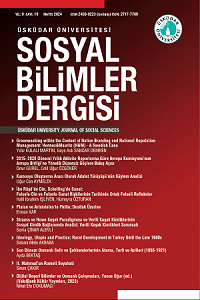 | 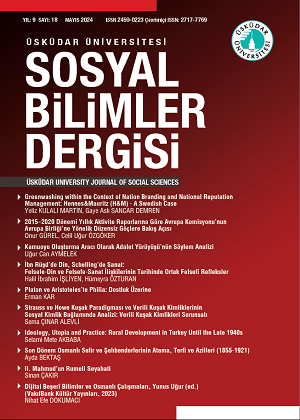 | ||
| Click to view(PDF) | Click to view(PDF) | ||
| YEAR: 7 ISSUE:13 NOVEMBER 2021 | YEAR: 8 ISSUE:14 MAY 2022 | YEAR: 8 ISSUE:15 NOVEMBER 2022 | YEAR: 9 ISSUE:16 MAY 2023 |
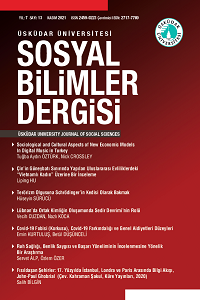 | 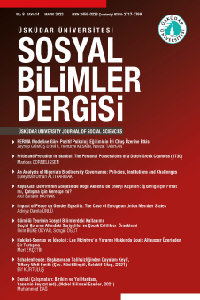 | 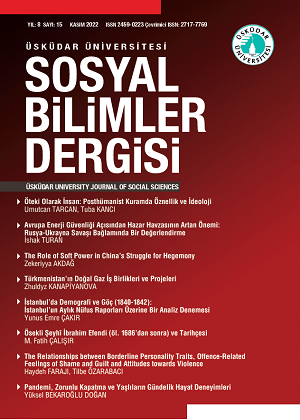 | 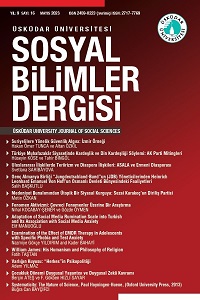 |
| Click to view(PDF) | Click to view(PDF) | Click to view(PDF) | Click to view(PDF) |
| YEAR: 7 ISSUE:12 MAY 2021 | YEAR: 6 ISSUE:11 NOVEMBER 2020 | YEAR: 6 ISSUE:10 MAY 2020 | YEAR: 5 ISSUE:9 NOVEMBER 2019 |
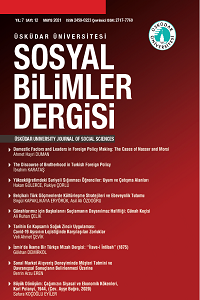 | 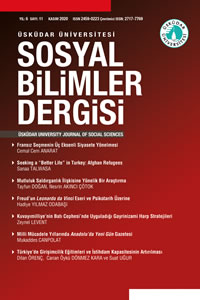 | 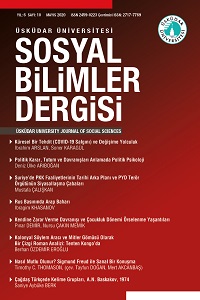 | 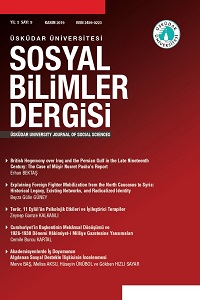 |
| Click to view(PDF) | Click to view (PDF) | Click to view (PDF) | Click to view (PDF) |
| YEAR: 5 ISSUE:8 MAY 2019 | YEAR: 4 ISSUE:7 NOVEMBER 2018 | YEAR: 4 ISSUE:6 MAY 2018 | YEAR: 3 ISSUE:5 NOVEMBER 2017 |
 |  |  | |
| Görüntülemek için tıklayınız. (PDF) | Click to view (PDF) | Click to view (PDF) | Click to view (PDF) |
| YEAR: 3 ISSUE:4 MAY 2017 | YEAR: 2 ISSUE: 3 NOVEMBER 2016 | YEAR: 2 ISSUE: 2 MAY 2016 | YEAR: 1 ISSUE: 1 NOVEMBER 2015 |
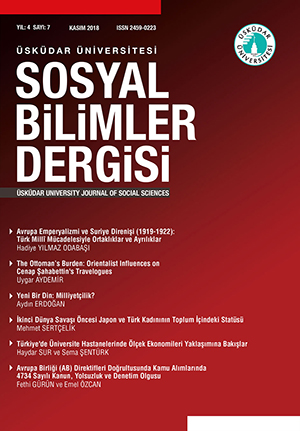 |  | 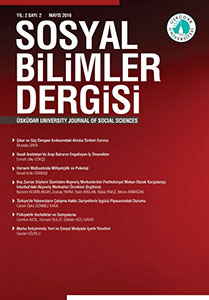 | 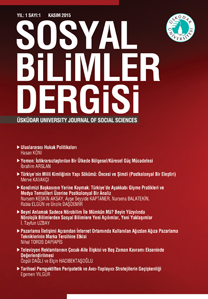 |
| Click to view (PDF) | Click to view (PDF) | Click to view (PDF) | Click to view (PDF) |
Üsküdar University
Altunizade Mah. Haluk Türksoy Sk. No: 14, PK. 34662 Üsküdar/İstanbul/Türkiye
Phone: (0216) 400 22 22 / Ext. No: 2604
Please send your article to http://dergipark.gov.tr/uskudarsbd
For your questions: uusbd@uskudar.edu.tr
Görüntüleme : 1702
